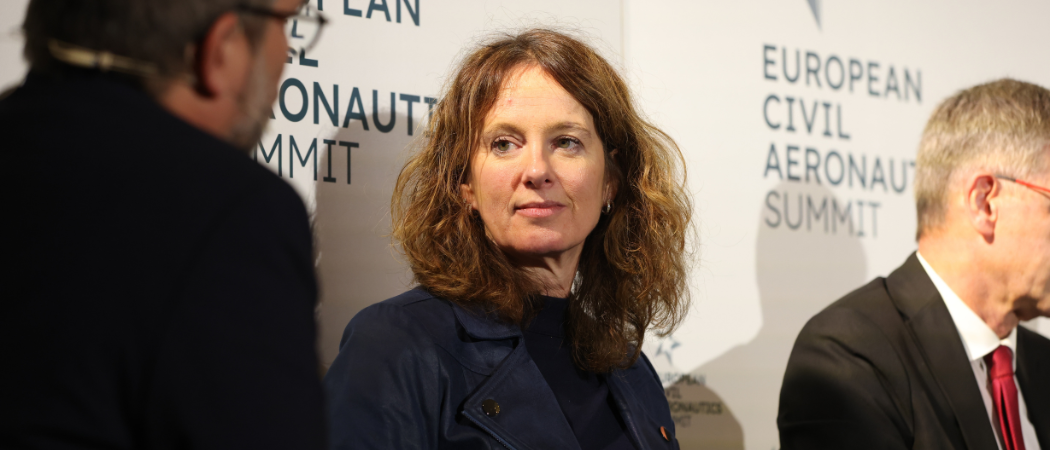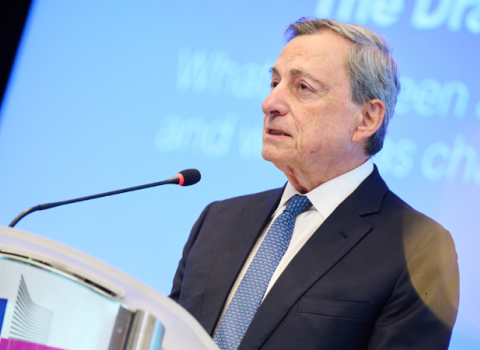Commission’s Clean Planet chief expects simplified partnership in Horizon Europe’s successor, as collaborative research faces an uncertain future

Rosalinde van der Vlies, director of the Commission’s Clean Planet Directorate in DG Research and Innovation, attending the European Civil Aeronautics Summit 2024 in Brussels. Photo credits: Mégane Fontaine / European Civil Aeronautics Summit
It is likely to be evolution not revolution for collaborative research and innovation programmes in the next budget cycle running from 2028 - 2034, the European Civil Aeronautics Summit heard on Tuesday.
Rosalinde van der Vlies, director of the Commission’s Clean Planet Directorate in DG Research and Innovation, suggested a smaller number of partnerships will continue under a simplified framework, noting Ekaterina Zaharieva, commissioner to-be for start-ups, research and innovation, has promised to make simplification a priority. “This is not new, but I really believe this lady means business,” said van der Vlies.
There are question marks hanging over the place for collaborative research in Horizon Europe’s successor, Framework Programme 10, also due to begin in 2028.
“I think partnerships will continue to play a very important role also in the next multi-annual financial framework, but we will need to simplify the governance structure of how we do partnerships,” van der Vlies said.
In Horizon Europe, there are some 50 research and innovation partnerships, with nine more in the works. These fall into three categories depending on their legal status and whether they involve public or private partners.
“This all looks very complex,” van der Vlies said. “Definitely there is some scope to simplify the way that we as the European Commission partner up with industry,” she told the conference organised by the Aerospace, Security, and Defence Industries Association of Europe (ASD).
The comments are the strongest indication yet that collaborative research will not be sidelined as the EU seeks to ramp up support for fundamental research and for deep-tech start-ups.
Both President Ursula von der Leyen, and Mario Draghi in his report on EU competitiveness, have called for an expansion of the European Research Council (ERC), which funds basic science, and the European Innovation Council (EIC), which supports innovation. But neither has had much to say about collaborative research.
The expert group set up to advise the Commission on its future R&I programmes recommended creating a European Technology and Industrial Competitiveness Council to give industry a greater role in steering the partnerships, including phasing out “ineffective” partnerships.
Beyond simplification, van der Vlies said collaborative instruments should move to an “ecosystem approach”, which links demonstration with industrialisation, and considers the regulatory environment and investment needs.
With just one tenth of public research spending in Europe taking place at EU level, it will also be important to work towards more alignment, she added.
“I think we need to develop a common strategic research and innovation agenda, not only between the European Commission and the industry, but also together with the member states.”
Clean Aviation
The Clean Aviation joint undertaking, one of the largest partnerships in Horizon Europe, is among those contemplating its future in FP10.
The partnership aims to deploy more efficient aircraft with the technologies it is developing by 2035, but it is important to look beyond that date, said van der Vlies.
“Some people would say we need to accelerate, we need to deploy, deploy, deploy, and that’s of course true. But at the same time, we need to continue to invest in research and innovation also for our longer term future, which is our 2050 perspective,” she said.
The partnership was set up to focus on disruptive innovation and a small number of priorities. Going forward, its scope will have to be reviewed, said Axel Krein, executive director of Clean Aviation.
Projects currently focus on technologies for new regional, and short and medium-range aircraft, which account for around 55% of CO2 emissions, he said. “We are not working at all on the other 45%: new long-range aircraft technologies.”
Three quarters of the partnership’s work focuses on propulsion technologies, and it is left to other initiatives to cover improvements in fields such as aerodynamics. “At the moment we are making an informed guess that others are doing it,” Krein said. “I think we need to come to a kind of workshare […] What am I going to do, what are you going to do, how do we interface, at what time? That needs to happen at European level, and I think this is not happening right now.”
Krein also wants the partnership to focus more on industrialisation, and bringing new technologies to the market as quickly as possible. He pointed to the launch of two aircraft demonstrators in the US as a positive example.
“This is an instrument we don’t have in Europe, and I think that’s definitely something we should consider, and see how we can be working not only at component demonstration but that we move the next step into this aircraft-level demonstration,” he said.
The big industry players see clear value in collaborating through Horizon Europe. “The beauty of this for me is the leverage effect and the inclusiveness of these partnerships,” said Eric Dalbiès, chief technology officer at French multinational Safran.
“The condition to receive this public money from either side is to build consortia, industrial partnerships, embracing the supply chain,” he said. “That’s the way to not just prepare the relevant technology for the future, but to also prepare our supply chain.”
Clean Aviation is one of two joint undertakings in the sector, alongside SESAR 3, which develops and deploys technologies to support the digitisation of air traffic management in Europe.
In its FP10 position paper, ASD urged the EU to maintain these dedicated initiatives, and not replace existing partnerships with a Competitivneess joint undertaking, which is one of the recommendations in the Draghi report.





 A unique international forum for public research organisations and companies to connect their external engagement with strategic interests around their R&D system.
A unique international forum for public research organisations and companies to connect their external engagement with strategic interests around their R&D system.